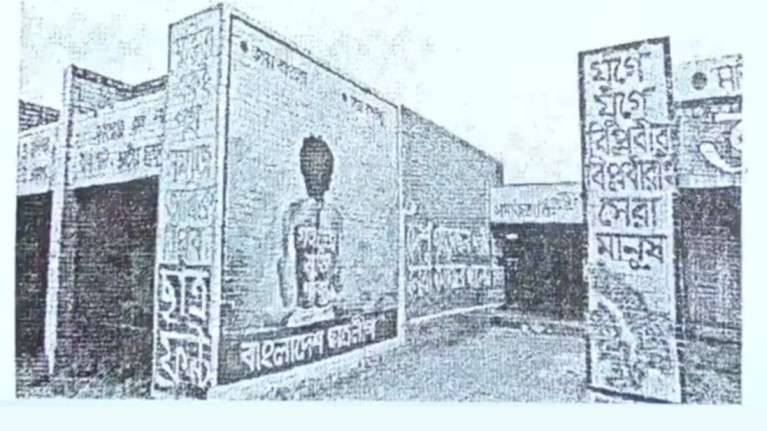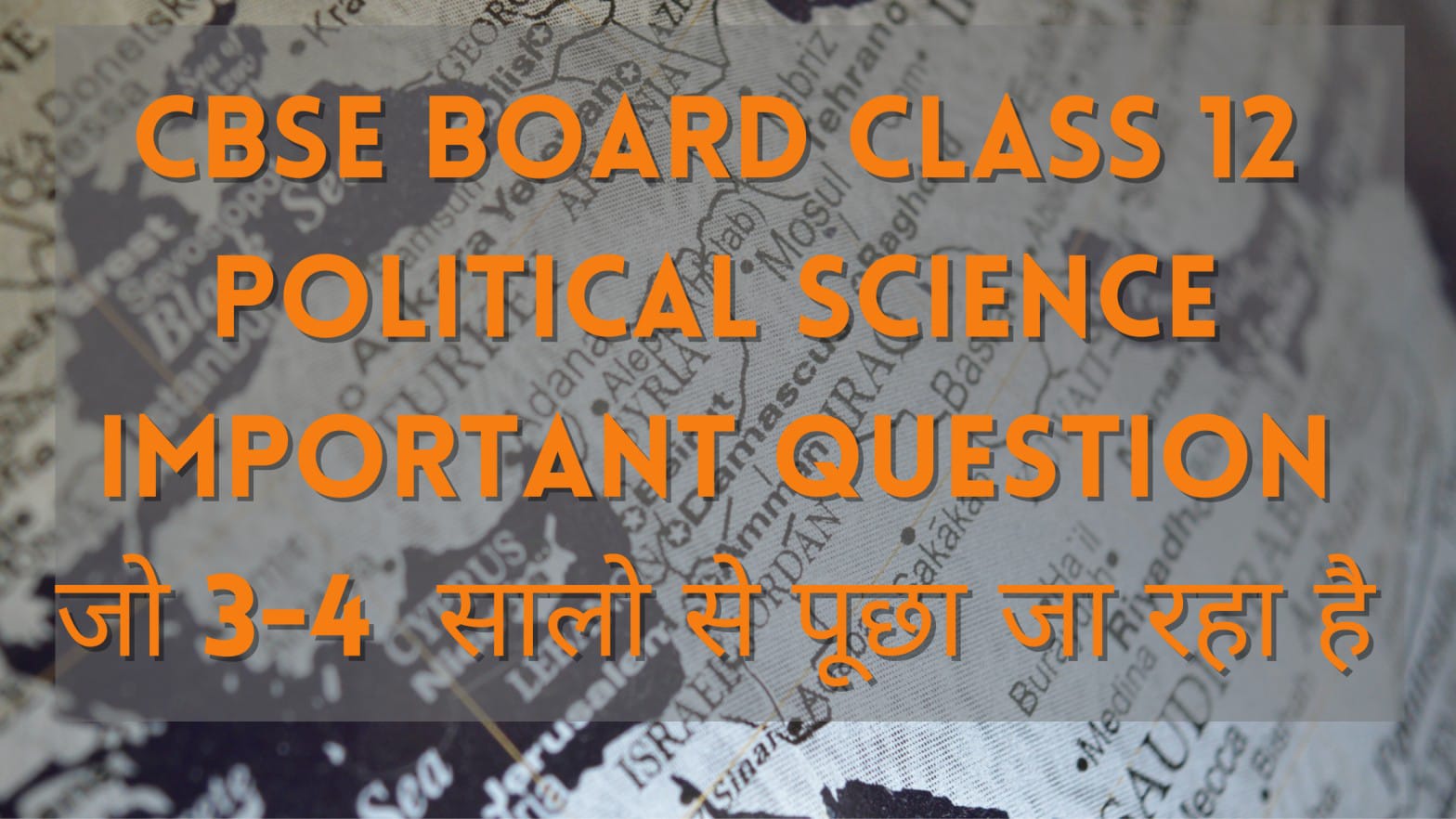CBSE Board Exams are starting in February. So, I have brought CBSE Board Class 12 Political Science Important Questions 2024 which are being asked the same for last 3-4 years. Try to solve these questions for securing high marks in your board examinations.
You can also check the Important Questions for Physics, Chemistry, English, Biology and Other Subjects.
CBSE Board Class 12 Political Science Important Questions 2024: Objective
1. Read the following passage carefully and answer the questions that follow:
India conducted a series of nuclear tests demonstrating its capacity to use nuclear energy for military purposes. After this, Pakistan also conducted tests. International Community imposed sanctions on both India and Pakistan which were subsequently waived. India opposed the international treaties aimed at non-proliferation.
(i) In which year did India conduct series of nuclear tests?
(a) 1971
(b) 1985
(c) 1992
(d) 1998
(ii) Identify the treaty that India refused to sign.
(a) Comprehensive Test Ban Treaty
(b) Shimla Agreement
(c) Panchsheel Agreement
(d) Indus waters Treaty
(iii) Under whose guidance did India initiate its nuclear programme ?
(a) C.V. Raman
(c) A.P.J. Abdul Kalam
(b) Homi J. Bhabha
(d) K. Kasturirangan
2. Which one of the following statements about the Second Five Year Plan is not correct?
(a) It was drafted by some leading industrialists.
(b) It stressed on the development of heavy industries.
(c) Its time period was 1956 – 61.
(d) It wanted to bring about quick structural transformation.
3. Which among the following is a threat to non-traditional security?
(a) War
(b) Manufacturing of weapons
(c) Terrorism
(d) Internal disturbances
4. Arrange the following in chronological order :
(i) Split in Congress Party
(ii) Imposition of Emergency by Indira Gandhi
(ⅲ) Fifth General Elections
(iv) Appointment of Lal Bahadur Shastri as Prime Minister
Choose the correct option:
(a) (i), (iv), (ii), (iii)
(b) (ii), (iv), (i), (iii)
(c) (i), (ii), (iii), (iv)
(D) (iv), (i), (iii), (ii)
5. Which of the following statements about the ‘Arab Spring are not correct?
(i) It began in 2008.
(ii) The struggle was against terrorism and pollution.
(iii) It raised its voice against corruption and unemployment.
(iv) It was basically a demand for democracy.
Select the correct option:
(a) (ii) and (iv) only
(b) (iii) and (iv) only
(c) (i) and (ii) only
(d) (i) and (iii) only
6. A process of exchanging information on defence matters between nations on a regular basis is known as
(a) Confidence-Building Measures
(b) Arms Control
(c) Alliance
(d) Disarmament
7. Who became the Prime Minister of India after the death of Jawaharlal Nehru in 1964?
(a) Jagjivan Ram
(b) Morarji Desai
(c) Indira Gandhi
(d) Lal Bahadur Shastri
8. Which one of the following countries is not a member of SAARC ?
(a) India
(b) Nepal
(c) Sri Lanka
(d) China
9. Study the given picture and answer the questions that follow :


(i) The given picture belongs to which one of the following countries ?
(a) Myanmar
(c) Bangladesh
(b) Nepal
(d) Sri Lanka
(ii) The memorial shown in the picture is located at which one of the following places?
10. Read the passage given below and answer the questions that follow :
The leaders of the Indian national struggle did not believe in the two-nation theory. And yet, the partition on religious basis had taken place. The Muslim League was formed to protect the interests of the Muslims in colonial India. It was in the forefront of the demand for a separate Muslim nation.
(i) At the time of partition, which one of the following States was divided on the basis of religious majority?
(a) Uttar Pradesh
(b) Gujarat
(c) Bengal
(d) Jammu and Kashmir
(ii) Which one of the following Princely States was the first to announce to remain independent and not to join the Union of India?
(a) Hyderabad
(b) Manipur
(c) Junagarh
(d) Travancore
(iii) Why was the Muslim League formed?
(a) To propose two-nation theory’
(b) To form a new nation named Pakistan
(c) To prepare the constitution of Pakistan
(d) To protect the interests of the Muslims in colonial India
(iv) What was the stand of the Interim Indian Government on partition?
(a) It was against partition.
(b) It wanted peace, harmony and equality of religion.
(c) It wanted India to become a Hindu nation.
(d) It was in favour of treating people on religious basis.
11. Identify the main reason behind the investments of MNCs in developing countries.
(a) For the welfare of the underprivileged people.
(b) To increase their own assets and earn profits.
(c) For the benefit of other countries.
(d) To provide financial support to the developing countries.
12. On which basis does India claim permanent membership of the UN Security Council?
(a) Nuclear capability
(b) Located in Asia
(c) Being a secular country
(d) Large population and big economic power
13. Which one of the following is not the objective of NITI Aayog?
(a) To provide strategic input to the development process of India.
(b) To serve as a Think Tank of the Union government.
(c) To arrange funds for the developmental programmes.
(d) To put an end to the tardy implementation of the policies.
14. Arrange the following in the chronological order:
(i) Appointment of Lal Bahadur Shastri as Prime Minister.
(ii) Tashkent Agreement
(iii) The fourth General Elections,
(iv) Election of V.V. Giri as the President of India.
Choose the correct option:
(a) (i), (ii), (iii), (iv)
(b) (ii), (iii), (iv), (i)
(c) (iii), (iv), (i), (ii)
(d) (ii), (iv), (i), (iii)
15. What was the time period of ‘First Democratic Upsurge’ in India?
(a) From 1950s to 1970s
(b) From 1960s to 1970s
(c) From 1960s to 1980s
(d) From 1970s to 1980s
CBSE Board Class 12 Political Science Important Questions 2024
1. Which of these statements about the political decisions taken after independence related to development are correct?
(i) Almost everyone agreed that the development of India should mean both economic growth and social-economic justice.
(ii) It was also agreed that this matter cannot be left to businessmen, industrialists and farmers.
(iii) Only the government should play a key role to ensure growth with justice.
(iv) It was necessary to consult all political parties and get public approval.
2. Explain any three challenges faced by India at the time of its independence.
3. What makes the UN an indispensable organisation? What steps should be taken to make the UN more relevant in the changing context?
4. ‘Reforming the UN means restructuring of the Security Council’. Justify this statement with suitable arguments.
5. Explain the meaning of ‘ASEAN Way’? Name the pillars and objectives of ASEAN community. What are the components of the ASEAN Vision 2020?
6. Explain the factors that make European Union a highly influential regional organisation.
7. In the midst of severe competition and many conflicts, a consensus appears to have emerged among most parties. Describe any three points of consensus.
8. Discuss three reasons for setting up of the States Reorganization Commission after India’s independence.
9. Enlist the main considerations for bringing the Princely States with the Indian Union. Name the leader who played the historic role in this direction. What was his contribution?
10. Analyze the composition of the United Nations Security Council. What according to your opinion is the major difference in the privileges given to its permanent and non- permanent members?
11. In this changing world, a strengthened and revitalized UN is desirable. Highlight the necessary reforms for an empowered United Nations.
12. Give an analysis of the cultural and political consequences of globalization.
13. Coalition governments proved to be a boon for democracy in India. ‘Support the statement with three relevant arguments.
14. Analyze three major developments towards the end of 1980s that made a long- lasting impact on the politics of India.
15. Critically examine the consequences of disintegration of the Soviet Union.
16. Highlight any two functions of UNICEF which make it a significant part of the United Nations.
17. Suggest any two measures to strengthen India’s traditional security.
18. Explain any two reasons for the victory of Congress in the Southern States in the general election of 1977.
19. Evaluate any two functions of NITI Aayog.
20. Why is it necessary for coalition governments to accommodate and aggregate variety of interests? Explain.
21. “India’s impressive technological growth in recent years has made the country an attractive partner of US.” Support the statement giving any four examples.
22. Analyse any two developments of the recent years in Jammu and Kashmir.
23. “Globalisation has shifted power from nation-states to global consumers.” Support the statement with two arguments.
24. In the given political outline map of India (on page 15), four States have been marked as A, and D. Identify these States on the basis of information given below and write their correct names in your answer-book along with the respective serial number of the information used and the concerned alphabets given in the map as per the following format.
(i) The State related to V.V. Giri, the former President of India.
(ii) The State related to the Congress leader, K. Kamaraj.
(iii) The State from where the phrase, “Aya Ram, Gaya Ram” originated.
(iv) The State which faced the most acute food crisis in 1965 – 1967.
25. Highlight any three environmental concerns significant to global politics.

